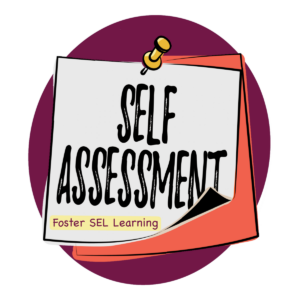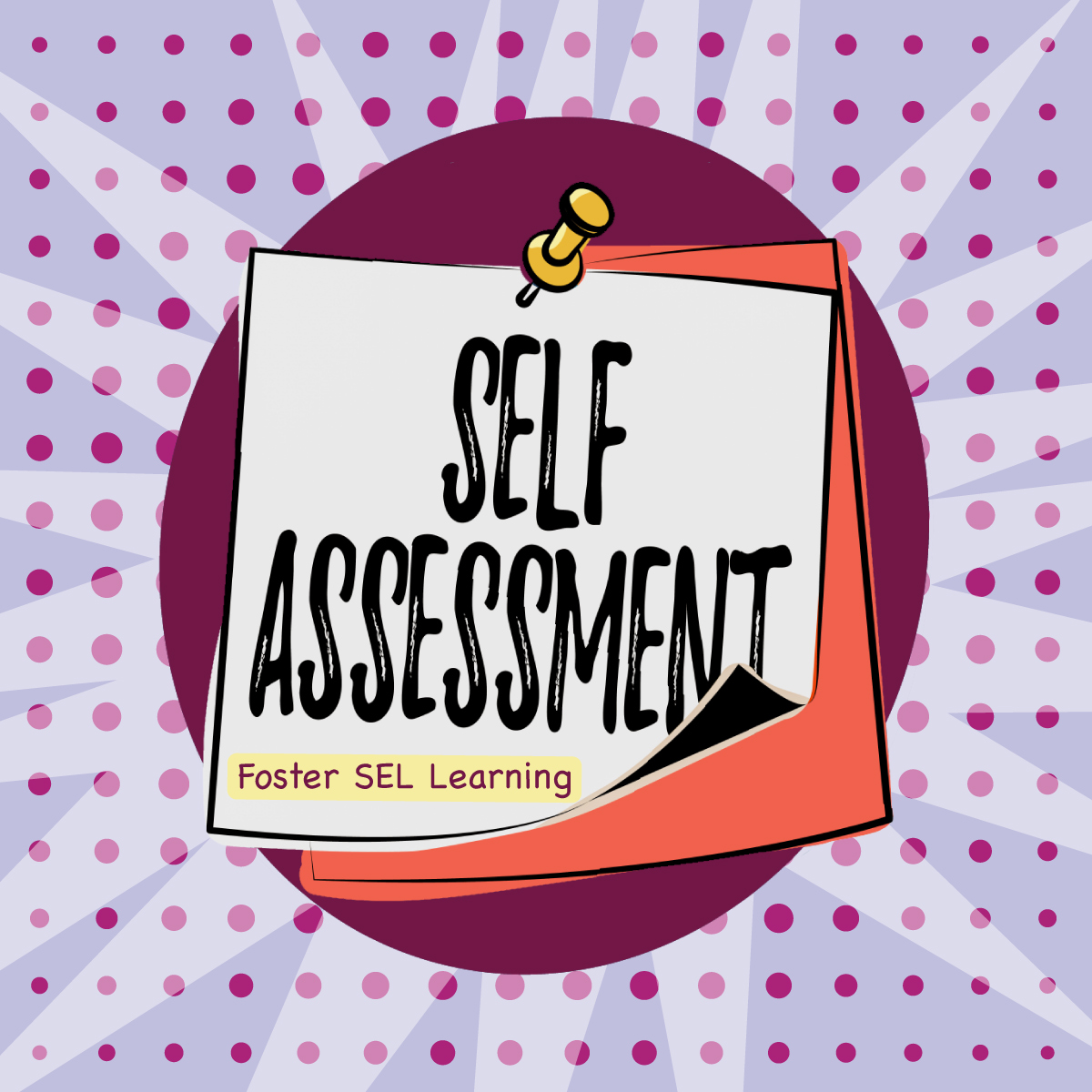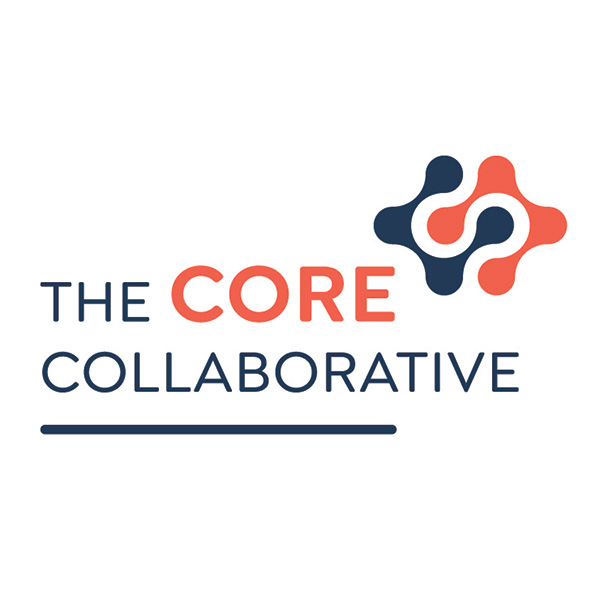By infusing self-assessment protocols to CASEL’s SEL competencies, we create opportunities for students to grow not only as learners but as empathetic, self-aware individuals capable of navigating the complexities of the world around them.
Reflection isn’t just about looking back; it’s about understanding oneself, identifying growth areas, and planning forward. When we embed self-assessment into the fabric of learning, we enable students to see their potential, fostering both academic and social-emotional growth. Integrating self-assessment protocols infused with the CASEL SEL competencies—self-awareness, self-management, responsible decision-making, relationship skills, and social awareness—can transform the way students engage with their learning and each other.
 Below are some practical self-assessment protocols designed to develop students’ SEL competencies while promoting deeper ownership of their learning journey. These approaches seamlessly integrate SEL into lessons, ensuring that students recognize the lifelong importance of social and emotional learning.
Below are some practical self-assessment protocols designed to develop students’ SEL competencies while promoting deeper ownership of their learning journey. These approaches seamlessly integrate SEL into lessons, ensuring that students recognize the lifelong importance of social and emotional learning.
1. Reflection Journals: Enhancing Self-Awareness and Self-Management
Protocol: At the end of each week, have students answer a set of guided questions in a reflection journal. Questions can include:
- What did I learn this week that I feel proud of?
- What challenges did I face, and how did I respond?
- How did I manage my time and focus?
- What will I do differently next week to improve?
CASEL Competency Connection:
- Self-Awareness: Encourages students to recognize their emotions, strengths, and areas for improvement.
- Self-management: This helps students track their goals and reflect on how they manage their actions and emotions, building regulation and perseverance.
2. Success Criteria Checklists: Building Responsible Decision-Making
Protocol: Work with students to co-construct the success criteria after introducing a new concept or task. As they work, students can use the checklist to self-assess whether they are meeting the criteria, which can be reviewed at the end of the task.
CASEL Competency Connection:
- Responsible Decision-Making: Students practice evaluating their progress and adjusting their approach, honing decision-making and problem-solving skills as they work toward their goals.
3. Peer Feedback Circles: Strengthening Relationship Skills
Protocol: In structured peer feedback sessions, students share their work and invite their peers to provide feedback based on co-constructed success criteria. Each student then reflects on the feedback received, noting how it can help them improve.
CASEL Competency Connection:
- Relationship Skills: Encourages students to communicate effectively, listen actively, and collaborate with their peers, reinforcing constructive feedback and cooperation.
4. “Stop, Start, Continue” Self-Assessment: Developing Self-Awareness and Social Awareness
Protocol: Periodically, ask students to reflect on their performance and behaviors in the classroom by responding to these three prompts:
- Stop: What behavior or habit is not working for me, and I need to stop?
- Start: What new behavior or strategy should I begin to improve?
- Continue: What am I currently doing well that I should continue?
CASEL Competency Connection:
- Self-Awareness: Students identify patterns in their actions and learning, becoming more aware of their strengths and areas for growth.
- Social Awareness: This reflection helps them consider how their actions impact the classroom community and their peers.
5. Daily Goal-Setting and Reflection: Fostering Self-Management and Responsible Decision-Making
Protocol: At the start of each day, students set one personal learning goal (aligned with SEL or academic goals). At the end of the day, they reflect on whether they achieved their goal and what strategies helped them succeed.
CASEL Competency Connection:
- Self-Management: Helps students regulate their actions and stay focused on their goals.
Responsible Decision-Making: Prompts reflection on choices and the actions that contributed to success or areas for improvement.
6. Collaborative Reflection Circles: Enhancing Social Awareness and Relationship Skills
Protocol: At the end of a unit or project, facilitate a reflection circle where students share their learning experiences and reflect on the group’s collaboration. Students can answer prompts such as:
- How did we work together to achieve our goals?
- What did I learn from my peers during this project?
- How can I contribute more to the group in future projects?
CASEL Competency Connection:
Social Awareness: Builds empathy as students recognize the contributions of others and reflect on how their actions impacted the team.
Relationship Skills: Reinforces collaboration and communication in a group setting, essential for developing healthy relationships.
7. Self-Assessment Rubrics: Supporting All SEL Competencies
Protocol: After introducing a new skill or project, provide students with a rubric that not only assesses academic outcomes but also self-regulation, collaboration, and perseverance. Students use this rubric to rate themselves on how well they’ve met these criteria at different stages of their learning.
CASEL Competency Connection:
This comprehensive approach allows students to engage with all five CASEL SEL competencies, encouraging a holistic reflection on both their academic and emotional development.
Fostering Reflective Practices for Lifelong Learners
Embedding self-assessment into everyday learning routines cultivates a reflective mindset that extends beyond academics. By infusing self-assessment protocols into CASEL’s SEL competencies, we create opportunities for students to grow as learners and as empathetic, self-aware individuals capable of navigating the complexities of the world around them. When students can assess their work and behavior through these lenses, they take a significant step towards becoming independent, reflective, and emotionally intelligent lifelong learners!



